|
Former Indian cricket captain and one of the greatest opening batsmen in cricket history, Sunil Gavaskar visited Global Indian International School (GIIS) in Singapore as part of the GIIS Leadership Lecture Series on November 21, 2014. Mr Gavaskar who was part of the Narendra Modi delegation to Australia recently, was on a visit in Singapore and graciously accepted the invitation to meet GIIS students and interact with them personally. Students from GIIS campuses in Noida, Bangalore, Indore and Pune in India, along with students from Tokyo, Japan and Kuala Lumpur, Malaysia joined the lecture through video-conference.
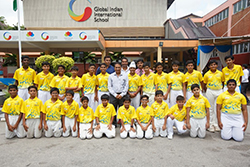 |
Sunil Gavaskar with GIIS Queenstown
Campus U-14 and U-12 cricket teams |
As Mr Gavaskar walked into the campus, every student was left in awe of the cricketer, especially the U-14 and U-12 Gold Squad Cricket team members from GIIS East Coast and GIIS Queenstown Campuses, who got a chance to interact with him one-on-one. His opening words, much like his batting style left many of them stumped when he asked, “Who are the silly guys?” Looking at the puzzled faces of the young cricketers, he smiled and added, “Opening batsmen are the silly guys, because they are the ones who face the fresh pitch when the ball is new and no one is certain about the state of the pitch”, leaving the students amused. After paying homage to Mahatma Gandhi and a brief interaction with students, Mr Gavaskar was escorted into the school auditorium where he received a grand welcome. He was accompanied on stage by four student panellists from the GIIS Gold Squad cricket team - Aditya Sudarshan (Class 12, GIIS Queenstown Campus), Ishan Mittal (IGCSE 9, GIIS Queenstown Campus), Janak Prakash (Class 9, GIIS East Coast Campus) and Rohan Mathur (Class 12, GIIS Queenstown Campus) - all as well as emcees Simran Sokhi (Class IGCSE 9 , GIIS Queenstown Campus), Rohan Rangarajan (Class 9, GIIS East Coast Campus) along with Mr Atul Temurnikar, Chairman and Co-Founder, Global Schools Foundation (GSF). Known for his strong defence on the cricket pitch, Mr Gavaskar enthusiastically spoke about how to ‘farm the strike’ in the game of cricket, and sustain the partnership between two batsmen. Mr Gavaskar who has for long been India@aps@s cricket ambassador globally also shared his life experiences and valuable advice that struck a chord with many students. On a lighter note, Mr Gavaskar requested the students not to bowl too many bouncers with their questions as he is a retired batsman. On being questioned about the importance of setting records in cricket, Mr Gavaskar who has set world records during his career for the most Test runs and most Test centuries by any batsman, said, "Don@aps@t set targets, play it your way!” Mr Gavaskar held the record of 34 Test centuries for almost two decades before it was broken by Sachin Tendulkar in December 2005.
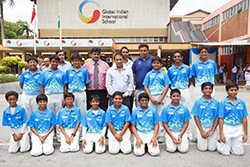 |
Sunil Gavaskar with GIIS East Coast
Campus U-14 and U-12 cricket teams |
Subsequently, Mr Gavaskar, took a moment to catch up with former Test cricket stalwart and the newly-appointed President of Global Schools Foundation, Mr Chandu Borde, over video conference. Mr Borde appreciated his readiness to be a part of the GIIS Leadership Lecture Series and felicitated him. The event left students excited with pride and joy as they interacted with the cricket legend and even got him to sign a few bats and autograph books.
Mr Gavaskar also recalled an incident of Mr Borde that he remembered.
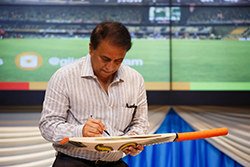 |
| Signing the bat for GIIS |
“Mr Borde used to walk in to bat without any helmet and once he would get off the mark he would signal to the dressing room to get his cap. He scored a 100 against Wesley Hall and Charlie Griffith at Brabourne stadium, when the first couple of wickets had fallen for nothing. It’s been an absolute privilege to be able to know Chandu Sir and to have fed off his experience because he is very generous with his experience and advise to youngsters. Really even as a player, I have tears in my eyes when I say that I’ve really been privileged Sir to have got all your experience and benefit.
Mr Atul Temurnikar also took the opportunity to share the news that Mr Chandu Borde has kindly agreed to be the President of the Global Schools Foundation.
|
|
GIIS students interacted with Sunil Gavaskar in a Q & A session during which he unfolded interesting facts about his cricketing era.
-
 |
Sunil Gavsakar responds to
questions from students |
Sumeet, Queenstown Campus: What was your reaction when you received your first bat from your parents?
I cannot describe the joy when I got the bat from my father. I grew up in a joint family and everybody was crazy about cricket. It was my mother who bowled the first ball to me when I was 3 or 4 years old. I hit the ball and it hit her nose she said to me, if you have to play this game then be prepared to get hurt and bear the pain.
- Janak Prakash, Class 10, East Coast Campus: Sir, I am curious to know when did you give your son his first cricket bat and as a parent how do you support him. Does your formidable reputation inspire him or intimidate him?
Rohan is a good bowler. His hero was Jeff Thomson of Australia, who by the way is the fastest bowler that I have played. Every time I would go for a match I would get him a brand new ball and he would sleep with all those balls under his pillow. Whether he is intimidated or not, I am not too sure. He was doing everything the wrong way around, he was a left handed batsman. I saw a couple of his dismissals when he was playing in India. I said to him that may be, what has happened is that your father has used up all the good luck and hasn’t left too much for you and maybe that’s why he hasn’t been able to make that progress.
- Karthik Iyer, Class 9 IG, GIIS Queenstown Campus: Your first book, ‘Sunny Days’ not only gives us the rich history of Indian cricket but contains some interesting anecdotes that tells us about your initiation into cricket? Sir, could you please share one anecdote that you particularly remember?
‘Sunny Days’ came about when I had hardly played cricket for five years. I was working at that stage for associated cement companies and because of my travelling overseas for matches, I didn’t really have a job as such. When I came back from my tour of West Indies, there was nothing really on the table to do. I had to pretend and show everyone around that I was working. So I started jotting down my experiences, my memories of the tour etc. That’s how the book came about. A journalist friend saw the writing and that’s how the book came about.
- Rishabh Jain, Class 8, GIIS East Coast Campus: As the world’s greatest opening batsman, you have set many records. According to you, what role does record-setting play in a sportsman’s life?
Well, you never set out to establish a record because you are then putting an added pressure on yourself. As it is there is a lot of pressure when you are going out to bat for example. The way I approach my batting was very simply to play it session by session, try to play up to lunch, try to play up to tea after that and then until the end of the day’s play. I didn’t set myself even run targets. Like for example, a lot of batsmen set themselves a target of 10 runs, then get to 20 and so on and so forth. What happens is if you have scored 6 runs and you need to get to 10 then you could actually hit a wrong shot to the wrong ball in trying to get 10. I never looked at the scoreboard and was never interested in knowing how much I had scored till I actually got out. I just wanted to bat.
- Yash Kulkarni, Class 9, GIIS Queenstown Campus: What responsibility do sportsmen carry on their shoulders when they are addressed as legends in the world of sports?
It’s a good question. I think the responsibility whether you are a legend or not is representing your team, whether it’s a school team, or a state team or a national team or a club team, in the best manner possible. To try and enable the team to be successful, to try and build a harmony within the team and build a team spirit which is going to take the team forward. I think that is the responsibility we need to look at not just if you are a legend. Legend is a name given by the media may be. If you start looking at yourself as a legend, you will overlook the fact that you are a human being.
- Keyur, Class 6, GIIS East Coast Campus: How should a batsman prepare himself for batting or bowling pitches? What adjustments are needed for both kinds of pitches?
It depends on the format you are playing. The test format is a different requirement, for the limited overs there is different requirement. If you look at the test format, as a batsman, you have the time and overs, you will take it easy for the first 30 minutes because you are still not used to what the ball is doing or the kind of bounce that’s there in the pitch. So try and play as they say as straight a bat as possible. As a bowler, while you have a new ball you are trying to get your line right. What is the line that the batsmen do not like? There are different requirements. For limited overs, you don’t have the time, you have play different kind of shots all across the ground. These things come with experience. As you play more, as you listen to your coaches and as you grow in your team, that’s how you will get better. “Every day you try and get better than the previous day” advised Sunil Gavaskar. If you’ve got out to a particular delivery, try and practice to that delivery and make sure you don’t get out for that.
- Shreyas Ravi, Class 10, GIIS Kuala Lumpur Campus: Is there any particular bowler who proved more of a challenge to you than the others?
If I have to take credit for scoring more than 10,000 runs in test cricket I am going to say every bowler gave me problems. Among the fast bowlers it was Andy Roberts for the simple reason that with the old ball he could still surprise you with the wicket taking ball.
- Akriti Varshney, Class 11, GIIS Queenstown Campus on behalf of GIIS Tokyo: What was the toughest moment in your life as a sportsman? Which moment do you relish most as a cricketer?
The moments what you cherish the most where the team has won. Nothing is greater than the moment when India won the World Cup in 1983. Just to be able to see Kapil Dev lift the World Cup and then realizing the joy it would have given the joy to millions of fans in India. When you represent your country, that’s a moment to cherish, moment to savour and remember.
- Prashant, GIIS Queenstown Campus: Not all moments on the field are moments of glory. There are millions of fans to cheer you on your success. But Sir, could you tell us how does one deal with one’s failure?
Well, I think you try and learn from failure. Today with video technology, with information technology you are able to do it a lot easier way. Today for example if you watch a telecast of match you will find that every time a batsman has got out and he has changed into his training gear and has taken off his pads and gloves he comes and sits with a computer analyst. Every team today has got a computer analyst. He sits with and he actually goes through how he has got out. Sometimes he has the coach sitting with him who will then tell them stake that he has made. You can see that mistake on the screen itself which wasn’t the case when we played. We generally relied on seniors like Chandu Sir or seniors in the team to be able to tell us how and what was the mistake we made and how we could get over it. The one way you got over failure is by practice and practice and get better. Try and avoid that error because the more you practiced against that particular delivery that got you out the better you are equipped to deal with it the next time.
|
|
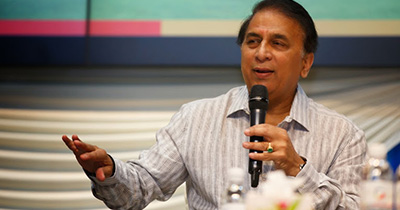
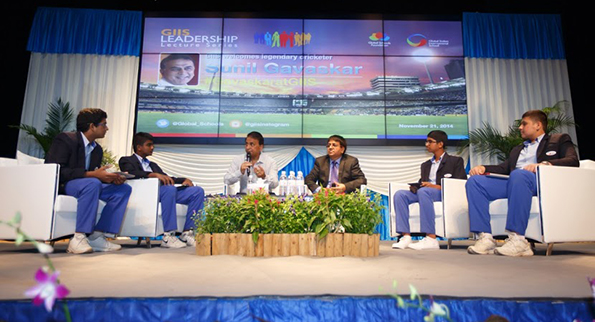








Comments ({{totalComments}})
Login to post a comment...
{{comments.CommentText}}